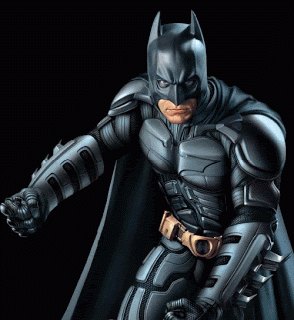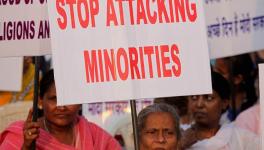Batman, The Dark Knight Rises...and Occupy Wall Street Falls
Batman: The Dark Knight by comicbooked.com
(Spoiler alert: Significant plot elements of the film are exposed in this review for the sake of analysis)
The latest Batman movie, and last, for Christian Bale anyway, has pulled in over $161 million in its opening weekend, though exact figures are not being released due to the Denver tragedy.
All kinds of reviews will be written about the quality of the film, its impact on the current incarnation of the 70-year old Batman franchise, and the box office records it will undoubtedly smash (with a little help from higher priced IMAX 3D sales).
But I'd like to focus a bit on a message that might have escaped most fans, Batman vs. Occupy.
To recap the relevant part of the story: The movie starts with Gotham City cleaned free of gangs by virtue of the late Attorney General Harvey Dent's law -- a law that brings the hammer down on organized crime, crushing it, perhaps at the cost of liberty, but certainly at the cost of truth -- for Harvey Dent was the violently schizoid villain of the last Batman film, whom Batman killed but then allowed to be lionized in order that a cult of personality would allow Dent's signature law to be carried out.
In the current film, Bane, played by strongman Tom Hardy, is the main villain against Batman, and is a product of a prison system that is basically governed by Anarchy -- that is, the strongest survive, while weaker members either die or find a mentor (spoiler alert: Bane turns out to be a protector and mentor to another pivotal character in the film, but that need not concern us here). Since Bane was among the strongest, he takes this political system to heart, eventually bending Gotham City to his will, with the help of a newly freed gang of thugs, some impossible-to-trace explosives laced throughout the city, but mostly the threat to use an atomic bomb to blow up Gotham, should the army try to wrest control back.
Bane encourages the "People" to take back their wealth from the 1%, to govern themselves, basically everyman for himself, with a former Batman nemesis, Scarecrow, running a Kangaroo court that is so corrupt it doesn't even bother with trials, just sentencing: Die or face Exile - which turns out to be basically the same thing as it entails walking out onto the East River's (the set city is actually New York -- Hollywood's favorite city to blow up) thin ice. Only the Fat Cats, the resisting police, and other "enemies of the people" are set out on the ice.
Now, Bane has a secret plan to let the unstable bomb count down to zero and finally blow up Gotham -- including himself and his gang -- eventually, but the public is unaware, or disbelieving of this for months, while an injured and defeated Batman languishes in the near-literal hellhole in some forgotten part of the Middle East world where Bane was originally imprisoned before his escape. So, effectively, Hollywood is showing the nightmare version of a post-Occupy anarchy, initially brought about by a powerful warlord, who then goes on to leave the people pretty much to fend for themselves, only intervening when it seems like the police who remain loyal to Commissioner Gordon (Batman's friend and supporter) in trying to restore order (the political faction has long since been disposed of at this point in the film).
The message is: Yes, there is injustice with the 1% undeservedly taking everything, but be careful what you wish for, because anarchy will be much worse.
The prisons are opened, supposedly, says Bane, to "free the oppressed." All institutions start to break down, and Washington remains paralyzed, afraid to intervene because if they do, or if just one Gotham citizen crosses out of the city on the few remaining bridges, the rest will be annihilated.
Catwoman, played fetchingly by Anne Hathaway, is a child of the street turned con artist and master thief. She captures a world-weary and cynical Bruce Wayne's heart, even while stealing his baubles. But the real question that hangs over her character is, How will she react now that her longed for revolution has finally arrived? She is released from prison, sure, along with Gotham's most dangerous, but after that she sees the breakdown, and finds it less than the vision of paradise she had imagined it to be. She is now just one of the masses, no longer able to exploit her charms to disarm and disown the wealthy, because there are no wealthy anymore to rob. Her tools are obsolete in a world with no targets, and where she is now an equal target to everyone else trying to survive in a world turned upside down. Catwoman starts out as grasping (literally as well as figuratively), selfish, unreliable, and profoundly manipulative. Somehow, Bruce Wayne / Batman sees something more in her, but the "more" ironically, would require her to renounce her former anarchistic dreams, and instead support at least a return to some form of organized life and, gasp, even government and police.
This is the choice the Batman (respectful fans talk of the Batman, not just Batman as if it were just a single name, like Fabio) gives us. Corruption, constantly held in check by a few do-gooders like most of the police, some of the politicians, but mostly Batman, though based on a lie (Harvey Dent's goodness). Batman, aptly subheaded: "The Dark Knight Rises" shows us that it's fine to battle against evil, one villain at a time, but don't try to change the basic system overall, or you will wind up with an uncontrollable mob, rule by violence, and a crumbling society that will eventually self-destruct -- even if a bomb doesn't destroy it first. Batman then, is the vigilante protecting the people from themselves. The Dark Knight who fights for our freedom because if we really had it, we take it away from ourselves. He can be trusted because he is so profoundly anguished from the death of his own parents at the hands of an (anarchistic) gunman. He knows firsthand what chaos brings, and so he will ironically preserve freedom by preserving the status quo, only cleaned piece by piece, of its corruption and evil, while leaving the corruption and evil breeding system relatively unscathed. This message is further driven home when Bruce Wayne, Batman's civilian alter-ego, perhaps his civilian SUPER-ego, spends the 7 years between the adventures of the last film, and this one, building a pollution-free energy source for the world"only to suppress it in a cavern that he can flood at the touch of a button should anyone actually threaten to take it form Wayne Industries. In the movie, Wayne's fears are proved prescient, because the core of the device does in fact, become the source of the atomic bomb Bane holds the city hostage with. See, the people cannot be trusted! They are not ready for free unlimited energy! Fortunately, Batman will save us, and Bruce Wayne will out-think us. No wonder he is a Dark Knight, not a White Knight. The paradox is that Batman must save us from killing ourselves -- an elite fighting the mob, while bringing down selective members of the elite when they stray off-course too much (like the financiers who originally fund Bane, before he turns on them too, as all anarchists must turn on their employers, eventually).
Batman is great fun, and the special effects are spectacular, as movie-goers have come to expect by now. But there is a twisted theme in the aging Batman series now, as it tries, not always successfully, to adapt itself to our contradictory times. In the 1940s, things were much simpler.
Scott Baker is a Senior Editor and Writer at Op Ed News, and a blogger for Huffington Post.
He is President of Common Ground-NYC (http://commongroundnyc.org/), a Geoist group focusing on achieving social justice and economic growth by untaxing (more...)
The views expressed in this article are the sole responsibility of the author
and do not necessarily reflect those of this website or its editors.
Get the latest reports & analysis with people's perspective on Protests, movements & deep analytical videos, discussions of the current affairs in your Telegram app. Subscribe to NewsClick's Telegram channel & get Real-Time updates on stories, as they get published on our website.

























